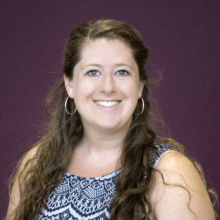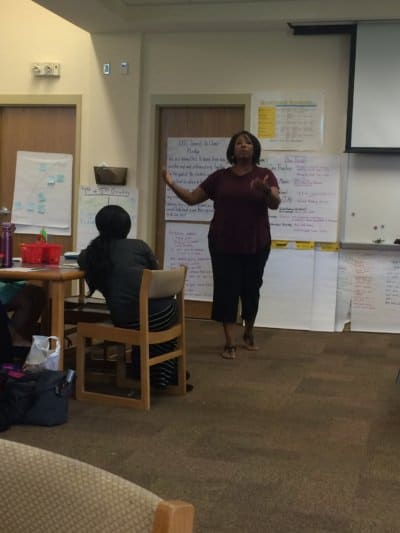
Interning at Bayer in the Crop Science division as part of my 2016-17 Kenan fellowship has been an enlightening, informative, and inspiring experience. I was fortunate to have shared this experience with Jasmine Frantz, a high school math teacher at Apex Friendship High School in the Wake County Public School System.
Jasmine and I are among 41 Kenan Fellows statewide awarded 2016-17 fellowships. One of my primary goals for being a part of the Kenan Fellows Program is to have an impact on others — not only students — but also teachers and schools.
This summer, we spent three weeks with Bayer at the Research Triangle Park site exploring the business and science perspectives of the agriculture industry, as well as the laboratories, the Bee Care Center, and the Greenhouse in order to create project-based learning activities to increase Ag Literacy in the classroom.
Our first day was packed with tours, meetings, and great discussions. We spent the next two days at the Innovation Center where cutting-edge research takes place. It was exciting to see first-hand how the technology used in these labs helps move science forward. We also had the chance to meet with sales reps to better understand grower challenges, and we were able to work in the greenhouse which included everything from planting, transplanting, transporting, watering, cleaning, threshing, harvesting, seed counting, and endless conversations and questions.

Undoubtedly, my most memorable time was getting in a bee suit and exploring the hive at the Bayer Bee Care Center. I have always marveled at the life of bees. This was a golden opportunity to pick the brains of apiarists. These passionate individuals keep bees at home while maintaining and studying the hives at the Bee Care Center. They were so helpful and willing to teach what they love!
Overall, I was surprised by how much we were immersed in the work. We were given a truly hands-on experience. It was not just telling us about what they do, but really putting us into the science, the research, and the culture of Bayer. I learned so much about agriculture and the education initiatives at Bayer as well as their investment in environmental safety and the way they encourage their employees to “AgVocate” — be an advocate for agriculture.
As we wrapped up the program, we looked at how we could continue to support each other in the future. We hope to set up field trips, bring in guest speakers and coordinate video conferences with our students.
As a part of this internship, I have been able to contribute to their Making Science Make Sense curriculum by developing and creating resources for employees and teachers to create hands-on science experiments in the classroom. On July 27, I helped with the Making Science Make Sense Teacher Workshop to attend and gain knowledge of Bayer and the company’s support of STEM education.
What will I take back to share with my colleagues to benefit our students? My mind has been racing as I do map after map of content, tying it into all the different grade levels. The connections to my classroom are endless, but the best content connection is probably with the third grade plants and soils unit.
I didn’t have much agricultural knowledge going into this, but I have increased my understanding exponentially. Now I have a plethora of experts just an email away as we strive to advance STEM education and its ties to agriculture in our classrooms. I cannot thank the employees of Bayer enough for their eagerness to share, teach, and allow us to explore their world.
I am especially grateful for our mentor, Danielle Mayber. She took us under her wing and set up the most wonderful experience. As a communications professional, she is well-connected and found just the right people for us to shadow and learn from. Every day was jam-packed with knowledge, content, and passion.




